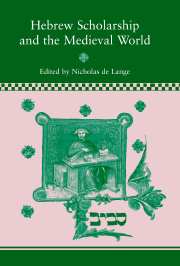Book contents
- Frontmatter
- Contents
- The contributors
- Preface
- List of abbreviations
- PART ONE NEW LINES OF INVESTIGATION
- PART TWO THE HEBREW LANGUAGE
- PART THREE PRAYER AND POETRY
- PART FOUR THE WORLD OUTSIDE
- 13 Hebrew apologetic and polemical literature
- 14 Biblical commentaries and Christian influence: the case of Gersonides
- 15 Jewish scholarship and Christian tradition in late-medieval Catalonia: Profiat Duran on the art of memory
- Bibliography of the writings of Raphael Loewe
- Index of names
14 - Biblical commentaries and Christian influence: the case of Gersonides
Published online by Cambridge University Press: 21 January 2010
- Frontmatter
- Contents
- The contributors
- Preface
- List of abbreviations
- PART ONE NEW LINES OF INVESTIGATION
- PART TWO THE HEBREW LANGUAGE
- PART THREE PRAYER AND POETRY
- PART FOUR THE WORLD OUTSIDE
- 13 Hebrew apologetic and polemical literature
- 14 Biblical commentaries and Christian influence: the case of Gersonides
- 15 Jewish scholarship and Christian tradition in late-medieval Catalonia: Profiat Duran on the art of memory
- Bibliography of the writings of Raphael Loewe
- Index of names
Summary
There is barely any philosophical system, from the ancient Greek schools down to the modern materialists, that has not found its adherents and advocates in Jewish schools or its place in the Jewish Commentaries on the Bible; the latter retain, more or less, indications of the intellectual atmosphere in which their authors lived.
The aim of this brief overview is to show that these ‘indications’ include the structure and literary arrangements of the commentaries as well as some basic assumptions about the relations between the ‘sacred page’ and philosophy, be it Arab or Christian.
The debt of Jewish to Arab philosophy has been acknowledged from the start of the history of philosophy as a discipline. Not only do Jewish philosophers write in Arabic, they also quote from Arabic authors. In Christian Europe, on the other hand, if Jewish philosophers knew Latin they generally do not say so, and, except in Italy, no Jewish philosopher or exegete quotes from Christian scholars. Although the influence of Christian thought on medieval Jewish exegesis has been recognized in a few instances, it is mostly the polemical aspects that are highlighted. The comparison between Jewish and Christian doctrines and ideas has yielded only meagre results, and we may wonder whether Jewish philosophers were really deaf to the culture within which they lived.
I do not presume to answer this question in the present study, but only to look at a few texts, in the hope that they may reveal some new facts.
- Type
- Chapter
- Information
- Hebrew Scholarship and the Medieval World , pp. 210 - 223Publisher: Cambridge University PressPrint publication year: 2001
- 2
- Cited by



